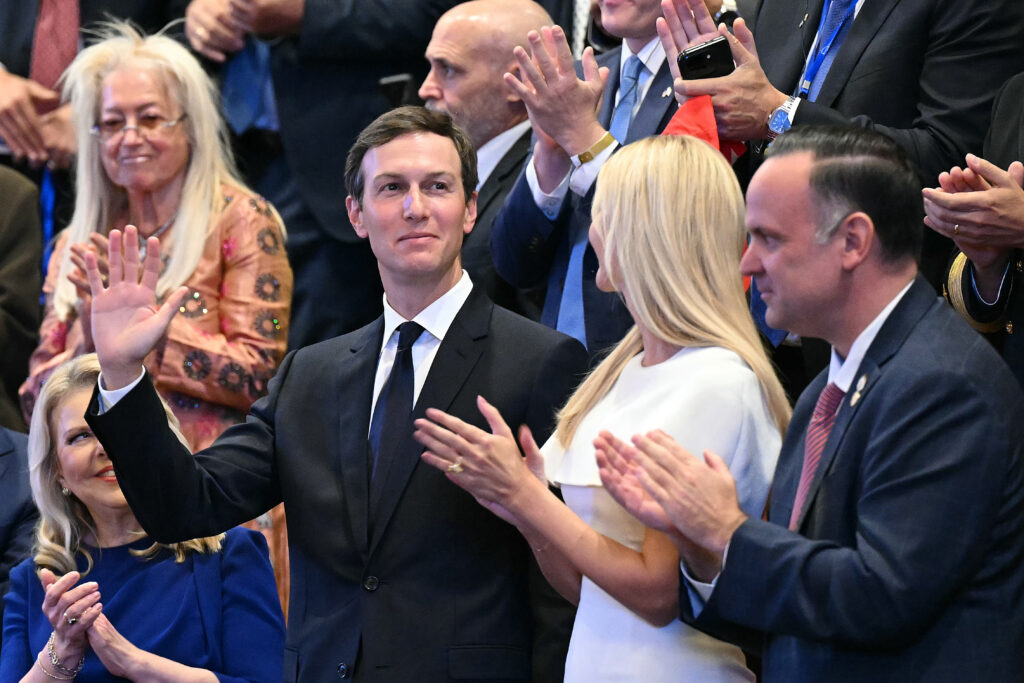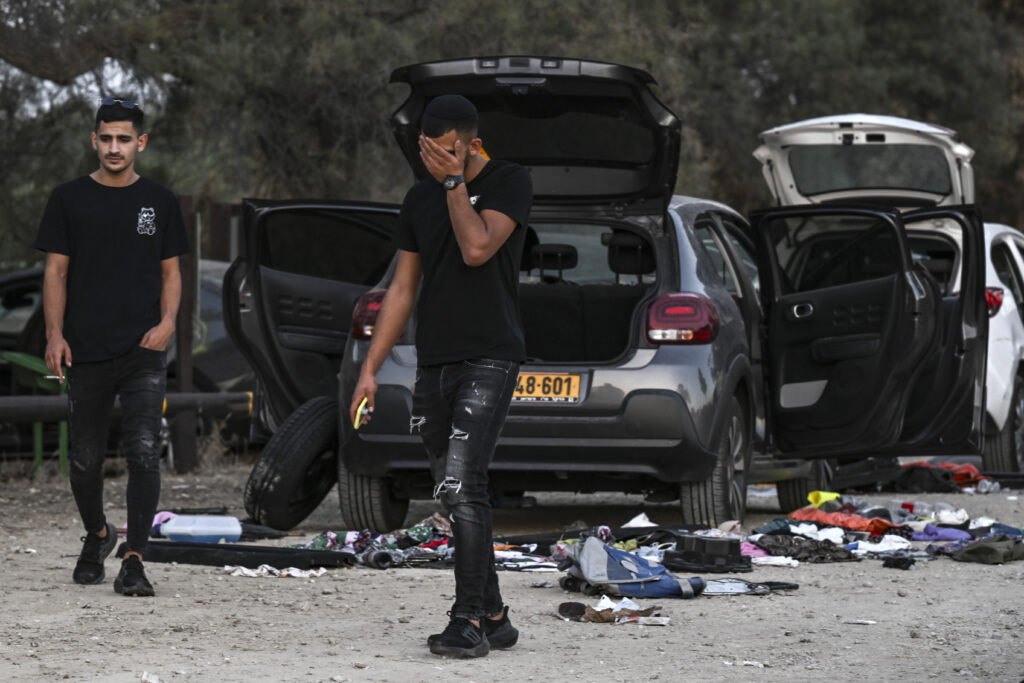AFP Asia Business
Kushner returns to team Trump, as ethical questions swirl
His only official job title at the White House is son-in-law. But Jared Kushner has staged a remarkable — and sometimes controversial — comeback to President Donald Trump’s inner circle.Four years after Kushner left the White House, Trump has handed the husband of his daughter Ivanka a key role in the Gaza and Ukraine peace talks.This week, the 44-year-old also emerged as an investor in a bid by Paramount to buy Hollywood giant Warner Bros., which if successful could mean the Trump family partially owning CNN, the president’s most-hated news channel.Kushner and Ivanka served as special advisors in Trump’s first term. But after his 2020 election loss they decamped to Florida and Kushner vanished into the private sector, insisting he would not return for a second administration.Since then, Kushner has founded an investment company largely funded by the same Middle Eastern countries that he dealt with in the first Trump term — and has become a billionaire, according to Forbes.That has raised ethical questions about possible conflicts of interest, which Kushner has denied and White House Press Secretary Karoline Leavitt has branded “frankly despicable.” But it has not stopped Trump, who has long mixed business and politics with family, from bringing him back in from the cold. “We called in Jared,” Trump told the Israeli parliament in October after the Gaza ceasefire deal. “We need that brain on occasion. We gotta get Jared in here.”- ‘Trusted family member’ -The White House said that Kushner was giving “valuable expertise” while stressing that he working as an “informal, unpaid advisor.””President Trump has a trusted family member and talented advisor in Jared Kushner,” Deputy Press Secretary Anna Kelly said in a statement to AFP, citing Kushner’s “record of success” in the Middle East.Trump and his roving global envoy, businessman Steve Witkoff, “often seek Mr. Kushner’s input given his experience with complex negotiations, and Mr. Kushner has been generous in lending his valuable expertise when asked.”The slim, softly-spoken scion of a property empire — whose father was jailed for tax evasion and later pardoned by Trump — Kushner faced accusations of inexperience when he joined Trump’s first team.But he ended up playing a key role in Trump’s signature diplomatic achievement, the Abraham Accords that saw several Muslim nations recognize Israel.During that time Kushner, who is Jewish, built enduring relationships with Gulf states like Saudi Arabia.As Trump sought a Gaza ceasefire in his second term, he turned again to his son-in-law.Kushner began to be seen around the White House again, and Trump dispatched him and Witkoff to negotiate with Israel, Hamas and Middle Eastern powers.After the Gaza deal, Kushner said his role was only temporary — and joked that he was worried Ivanka would change the locks of their Florida mansion and not let him back in if he stayed on.Yet the following month, Kushner turned up at the Kremlin with Witkoff to meet President Vladimir Putin. Top Kremlin aide Yuri Ushakov said Kushner “turned out to be very useful.”- Paramount bid role -Kushner’s business interests hit the headlines again this week when it emerged that his private equity firm, Affinity Partners, was among the investors backing Paramount’s battle with Netflix to buy Warner Bros.It added a political twist to the story, as not only has his father-in-law said he would get “involved” in approving any deal, but Trump also appears determined to clamp down on CNN, which is part of Warner.Kushner founded Florida-based Affinity in 2021, with much of its funding coming from foreign sources, particularly the Middle Eastern governments he’d done business with.Saudi Arabia’s Public Investment Fund (PIF) gave $2 billion in 2022, the New York Times reported. The Qatar Investment Authority and Abu Dhabi-based Lunate Capital together gave around $1.5 billion in 2024, Kushner said in a podcast last year.Kushner’s firm now manages $5.4 billion, according to a press release in September.A US Senate finance committee launched an inquiry last year into whether Affinity was effectively being used as a foreign influence-buying operation with the Trump family ahead of the 2024 election, saying it had won millions in fees from foreign clients without returning any profits.Affinity Partners did not reply when contacted by AFP.Kushner hasn’t commented on the Paramount deal, but he has previously rejected any suggestions of ethical breaches, particularly regarding his Gulf ties.”What people call conflicts of interest, Steve and I call experience and trusted relationships,” he told the CBS program “60 Minutes” when it interviewed him and Witkoff in October on the Gaza deal.
Amnesty accuses Hamas of crimes against humanity on Oct 7 and afterwards
Amnesty International on Thursday accused Hamas and its allies for the first time of crimes against humanity during and after their October 7, 2023 attack on Israel, with the Palestinian militant group rejecting the report as “lies”.The findings also drew criticism from Israel, which accused Amnesty of bias and of failing to give a full accounting of the crimes committed during the attack, which sparked the Gaza war.”Palestinian armed groups committed violations of international humanitarian law, war crimes and crimes against humanity during their attacks in southern Israel that started on 7 October 2023,” the human rights watchdog said in its 173-page report.Amnesty said the mass killing of civilians that day amounted “to the crime against humanity of extermination”.Hamas condemned the report, saying it contained “inaccuracies and contradictions”.”The report’s repetition of the lies and allegations promoted by the occupation (Israeli) government concerning rape, sexual violence, and the mistreatment of captives clearly demonstrates that the purpose of this report is incitement and distorting the image of the resistance,” the group said in a statement.It called on Amnesty to retract the “flawed and unprofessional” document.Israel, meanwhile, said the report failed to show the full extent of the attack.”It took Amnesty International more than two years to address Hamas’s heinous crimes, and even now its report falls far short of reflecting the full scope of Hamas’s horrific atrocities,” foreign ministry spokesman Oren Marmorstein wrote on X, accusing the rights group of being a “biased organisation”.Amnesty has previously accused Israel of committing genocide in its retaliatory campaign in Gaza, an accusation Israel has vehemently denied.The rights group said Hamas and other Palestinian armed groups in Gaza “continued to commit violations and crimes under international law in their holding and mistreatment of hostages and the withholding of bodies seized”.”The holding of hostages was done as part of an explicitly stated plan explained by the leadership of Hamas and of other Palestinian armed groups,” the report stated.- Mass killing -Amnesty previously accused Hamas and other groups of committing war crimes, which are serious violations of international law against civilians and combatants during armed conflict.Crimes against humanity can occur in peacetime and include torture, rape and discrimination, be it racial, ethnic, cultural, religious or gender-based. They involve “a widespread or systematic attack directed against any civilian population”.The October 7 attack resulted in the deaths of 1,221 people. Militants also took 251 people hostage that day, including 44 who were dead.Of the 207 hostages taken alive, 41 died or were killed in captivity. All have since been returned — mostly under a series of ceasefire agreements — except for the body of one Israeli officer.Among the acts listed by Amnesty as crimes against humanity were murder, extermination, imprisonment, torture, enforced disappearance, rape and “other forms of sexual violence”.For the latter crimes, Amnesty said it was unable to interview survivors except for one case, and therefore could not conclude the scope or scale of the sexual violence.The report concluded Hamas and its armed wing were “chiefly responsible” for the crimes.Hamas ally Palestinian Islamic Jihad, as well as the Al-Aqsa Martyrs’ Brigades and “unaffiliated Palestinian civilians”, were responsible to a lesser extent.- Arrest warrants -In May 2024, the International Criminal Court (ICC) applied for arrest warrants for Hamas political bureau chief Ismail Haniyeh, head of its armed wing Mohammed Deif, and its October 7 mastermind Yahya Sinwar, who was the group’s then chief in Gaza.The ICC withdrew the applications after all three were killed later that year by Israel.The court also issued a still-active arrest warrant for Israeli Premier Benjamin Netanyahu and former defence minister Yoav Gallant in November 2024 for war crimes and crimes against humanity committed during the war.In December 2024, Amnesty accused Israel of committing genocide against Palestinians in Gaza. It warned late last month Israel was “still committing genocide”, despite the current ceasefire.When Amnesty first made the accusation, Israel strongly rejected it as “entirely false” and called the report “fabricated” and “based on lies”.Israel’s retaliatory assault on Gaza has killed at least 70,373 people, according to figures from the territory’s health ministry that the United Nations considers reliable.


